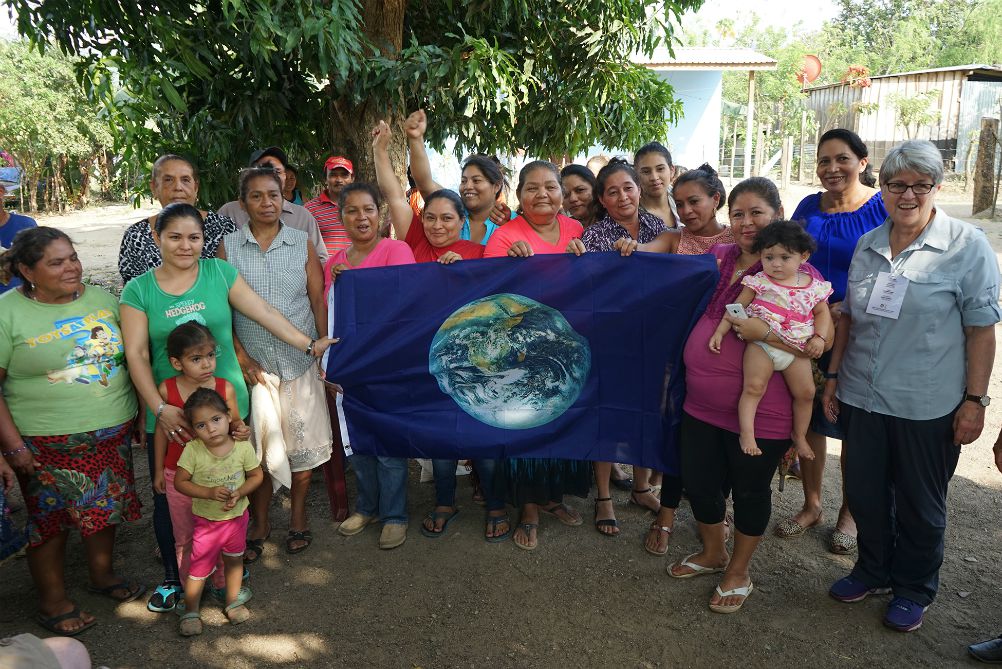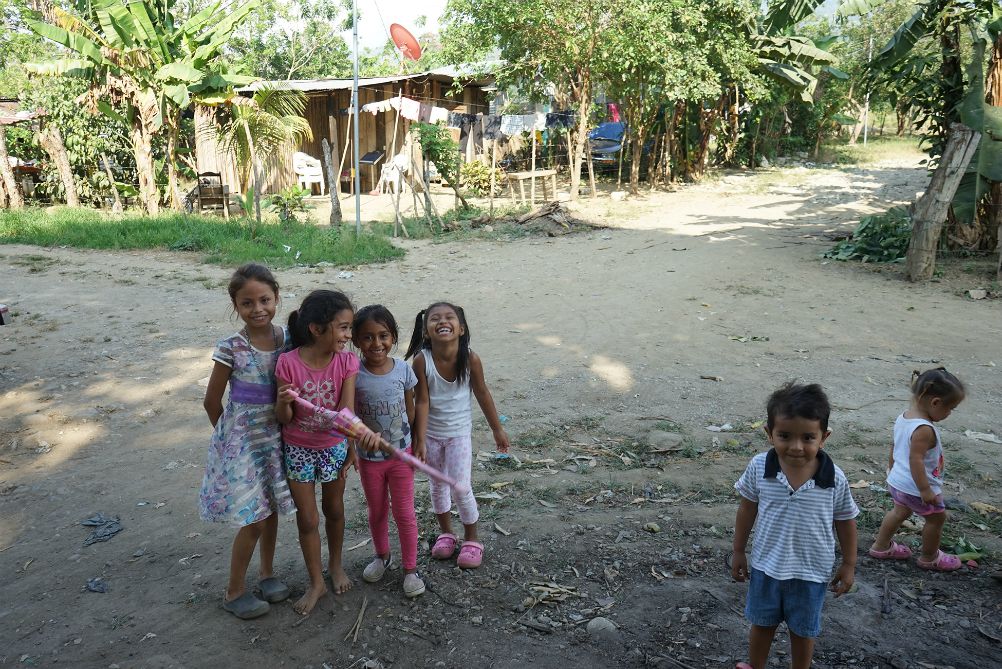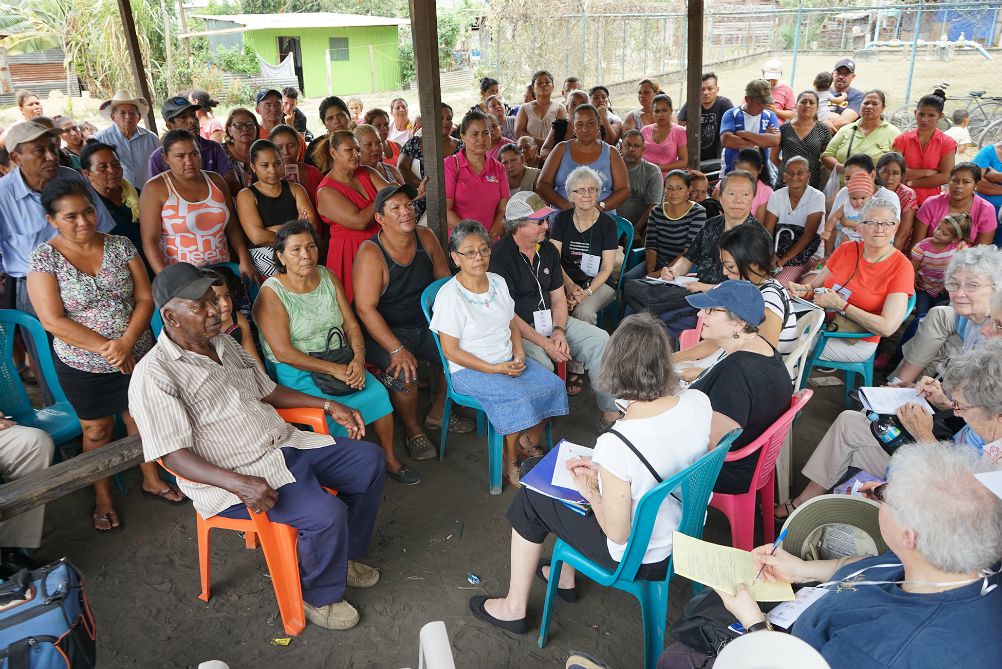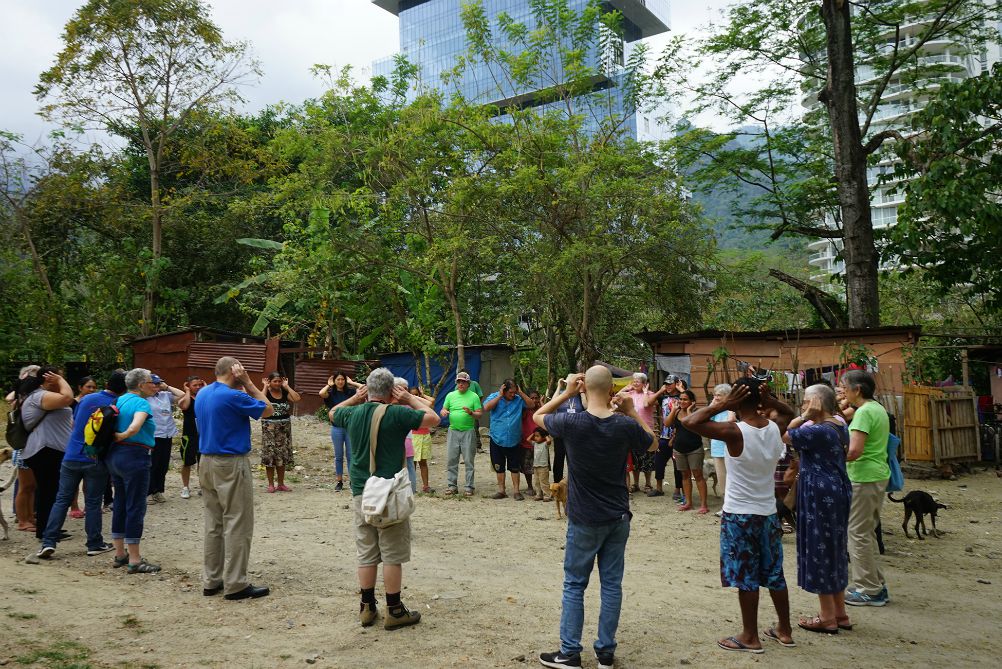
Editor's note: From March 18 to 25, an interfaith group of about 75 people, including two dozen women religious, traveled to Honduras in a "reverse caravan" to see for themselves why tens of thousands of people have fled for their lives. Global Sisters Report is featuring columns from sisters who were part of the People of Faith Root Causes Delegation, which was sponsored by the Leadership Conference of Women Religious, SHARE el Salvador (Salvadoran Humanitarian Aid, Research and Education Foundation), the Sisters of Mercy of the Americas and the Interfaith Movement for Human Integrity. Read all of the columns.
Land, Water and Community were often repeated values seen on signs and in persons who are poor and desperate in Honduras. "People of Faith Root Causes Pilgrimage to Honduras" was a diverse gathering of about two dozen Catholic sisters, several Unitarians, and two or three Jewish people — many from California where SHARE-EL SALVADOR is located — several from Peru, and a smattering of others who could translate or with special talents and experience.
SHARE has experience at organizing delegations and was one of the sponsors. The Leadership Conference of Women Religious and the Sisters of Mercy were also sponsors. The Interfaith Movement for Human Integrity worked closely with SHARE to organize the delegation outreach and to carry out the activities in Honduras.
The School Sisters of Notre Dame have a retreat center and school in Honduras, in El Progreso city near the airport. After a brief orientation there, we split into three groups to go to rural and urban locations to learn about root causes of emigration. Immediately, the groups began seeing what the daily life for many Honduras is like. One group journeyed to a river area where mothers were washing clothes and kids were playing. It was not a wide river, but there were soldiers with machine guns on the other side. The delegates waded into the river, hoping to protect the women and children. The soldiers then disappeared.
A group in the El Progreso urban area visited with a homeless community where two wizened older women told us that they earned $1 per day picking up plastic bottles. Of that amount, 15 cents went to the municipality. The women and other residents of the community did not have a claim to the small area where they lived, in the shadow of two giant skyscrapers. The community had occupied land on a nearby public university, but expansion needs at the University had forced them out. The municipality has used tear gas to threaten them and make them move on; they do not resist moving from this vicinity but have nowhere to go. A number from this settlement joined the caravan of migrants to the U.S.

A member of the Jesuit center nearby translated for us and then handed out lunches to the community. The Jesuits have a very impressive radio station and center in El Progreso. Some of our delegates stayed at this location, and we had a variety of meetings there. One night, there was a festival outside the Jesuit Center. There was live music and kids enjoying themselves. Food was available. Some were dancing and lots were visiting. Father Melo (Ismael Moreno Coto) is a Jesuit who is very involved in developing the Jesuit radio station to reach FM and AM stations throughout Honduras. He has taken Hondurans to Washington to speak about the challenges of their lives here.
One afternoon we journeyed to the capital city, Tegucigalpa, located in a mountainous area in the center of Honduras. We arrived when a well-organized rally was taking place at the U.S. Embassy. There was a large crowd with several speakers and many signs expressing the needs of the people. If one only visited the capital, Honduran poverty would not be evident. Tegucigalpa is like big cities everywhere and one would have to be there for some time to see more than a busy urban center.
We spent the night at a place in the mountains called Bethany, where we slept on about 75 mattresses on the floor of what appeared to be a gym. The next day, we had a meeting with a human rights organization and learned the challenges they face keeping up with complaints about human rights abuses. One major issue is the abuse of women; an average of one woman a day is murdered.
We also met at the embassy where a spokeswoman listened to delegates who were prepared to discuss the misery of the people in various areas of Honduras. For one who represents the U.S. administration, it was evident that what she was hearing was not part of her daily awareness. She then talked candidly about the weak institutions in Honduras that make improvements difficult.
There was an impressive press conference with numerous media present. Our delegation had two banners announcing that we were religious leaders from the United States. We did not see the news afterwards but knew that some would report on it.

On our Sunday in Honduras, we had a rousing liturgy, and at the kiss of peace, the congregation went throughout shaking hands and hugging. The music was beautiful. On the way to the liturgy, we joined the local population in making the Stations of the Cross, stopping at places where violence had happened or was happening.
One plea from groups and individuals was that we persuade our government not to send aid to Honduras because it is used by the government, its army and police forces to oppress the people. They said that the ordinary poor people, 60% of the population, never see aid from the U.S. The aid is used to protect the multinationals who are stealing the land and water from the native people. Instead, nonprofits provide services in many areas. There are orphanages that take in not only actual orphans but also many whose parents are unable to care for them.
The root causes of immigration to the U.S. and the reasons for wanting to escape the hard life of Honduras are evident. But there is hope and a sense among many of "keeping on keeping on." They do not want to leave the country they love in spite of everything. In the San Diego port of entry, some family members have died in their attempts to immigrate. Those who return are criminalized by the Honduran government in the process.
Our delegation was warmly received by the people in Honduras. They do not blame us for what our government is doing and were grateful that we were there to learn from them. I will always remember a moment at our meeting with a neighborhood group. The movement was led by several women seeking to enforce their land rights in the face of local attempts to remove them from land on which the municipality wanted to build a hospital.
I was aware of a young mother behind me, and as the meeting ended, I introduced myself and met her daughter. The mother was carrying a baby about 9 months old. He took hold of my little finger and would not let go, even as his mother started moving away. I reflected later that this moment — when I felt at one with this small family — was one of my most memorable experiences of our journey.

[Patricia Keefe is a member of the Sisters of St. Francis in Rochester, Minnesota. After graduate studies in theology, she earned a law degree and practiced poverty law for eight years, winning a case in the Minnesota Supreme Court. She volunteer in the London office of Amnesty International then became director for justice and human development for the Oklahoma City Archdiocese and has done development work for the Nonviolent Peaceforce.]

